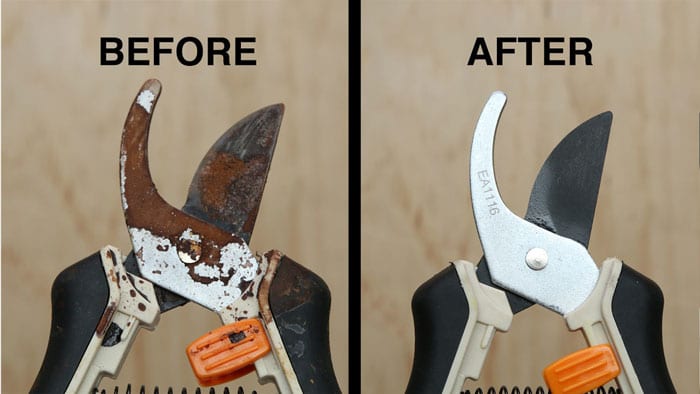6 Pro Tips For How To Remove Rust From Tools?

We need utility tools in our everyday life. I mean, even an 18 pound metal wrench is so useful to fix things.
But often tools become unusable, in courtesy of rust attack.
But, do you know what exactly rust is?
When metals react with the moisture from nature, it leads to rust. In scientific language, when iron reacts with oxygen and water, it yields ferrous oxide. The oxidation of iron is known to us as corrosion or rust.
Rust spreads rapidly over tools.
Suppose, you’ve bought a new wrench from the shop to work in your house. After a few months, you noticed that, there is a thick brownish layer all over your wrench. Ironically, your wrench can’t perform with rust on it.
Herein, buying a new tool is not always an easy solution.
So, where’s the solution?
The good news is there are several methods of wiping rust from tools. Yes, removing rust is a time consuming task. But if you do it right, you will be able to repair your tool at the comfort of your home.

Without further delay, we will now show different methods of rust removal from your metal tool. We will also analyze the advantages and disadvantages of each method.
Table of Contents
Method 1: Salt-Lemon Method
Necessary Materials
Necessary Steps
- Apply salt all over the rusted area. Make sure that, you have used a sufficient amount of salt in the whole affected area.
- Apply lemon juice in the rusty areas. Alternatively, you may use lime juice.
- Keep the rusty tool in that state for 3 hours. As a result, salt and lemon juice will mix perfectly.
- Now, scrub the rust off with the help of sandpaper. If you do not have sandpaper, use lemon peel instead. You may need to scrub a few times before all the rust comes off.
- Wash the tool in water for a fresh look.
This method is simple and can be done easily at home. However, it is only useful to wipe out small rusts from your tool.
Method 2: Soda-Paste Method
Necessary Things
Necessary Steps
- Make a paste of baking soda by mixing it in hot water. Make sure, the paste is thick.
- Apply the thick paste all over the rusty spots in your tool.
- After a few minutes, scrub the rusty area with a toothbrush.
- Wash and rinse your tool.
Just like the former method, this method is also easy to use at home.
Method 3: Vinegar Method
Necessary Elements
Necessary Steps
- Pour sufficient amount of white vinegar in the mason jar.
- Soak the rust affected area of your tool in vinegar for 24 hours.
- Scrub the tool with aluminum foil. The rust is supposed to come off.
- Use a paper towel to keep your tool clean and dry.

Vinegar reacts with the iron oxide. As a result, rust comes off. Obviously, this method does not require much scrubbing.
The downside is that you have to wait for 24 hours as the vinegar slowly reacts with rust.
Method 4: Potato Method
Necessary Materials
Necessary Steps
- Mix warm water and baking soda in the small bowl. If you do not have baking soda, then soap water is a good substitute.
- Cut the potato in two pieces. Soak the cut portion of one piece in the solution.
- After a while, take out the potato from the solution. Apply the cut part in the rust affected area of your tool.
- Potato will react with rust. Leave the potato on your tool for few hours.
- Afterwards, scrub the tool with a toothbrush. It will remove rust from your tool.
- Rinse and exsiccate your tool.
This method takes a few hours to work. It is identical to the soda paste method in terms of result.
Method 5: Citric Acid Method
Necessary Materials
Necessary Steps
- Combine citric acid and hot water in plastic container.
- Soak the tool in the solution. You may see some bubble.
- Wait for 12 hours.
- Rinse and dry up your tool.
This method is simple and takes considerable amount of time to clean up.
Method 6: Oxalic Acid Method
Things You’ll Need
Necessary Steps
- Combine oxalic acid with warm water in the jar. The ratio is 1:10. You should combine about 25ml oxalic acid. That is approximately 5 teaspoons.
So, you need to mix 25ml oxalic acid with 250ml (50 teaspoons) water. - Pour the item in the solution for 20 minutes.
- Clean the item with a paper towel.
- Carefully rinse it and dry it up.
This method is simple and takes less time. However, necessary precautions must be exercised. Wear gloves, protective clothes, and goggle before performing this method. Do not inhale toxic vapor.
Besides oxalic acid, you can also remove rust by purchasing efficient rust converter chemicals from store.
In conclusion
We have illustrated how to remove rust from tools in six different ways.
We think it is important to mention that, you need to dry up your tool after performing any of the above mentioned method. If you keep your tool wet for a long time, it will attract rust again.
That’s all from us.
